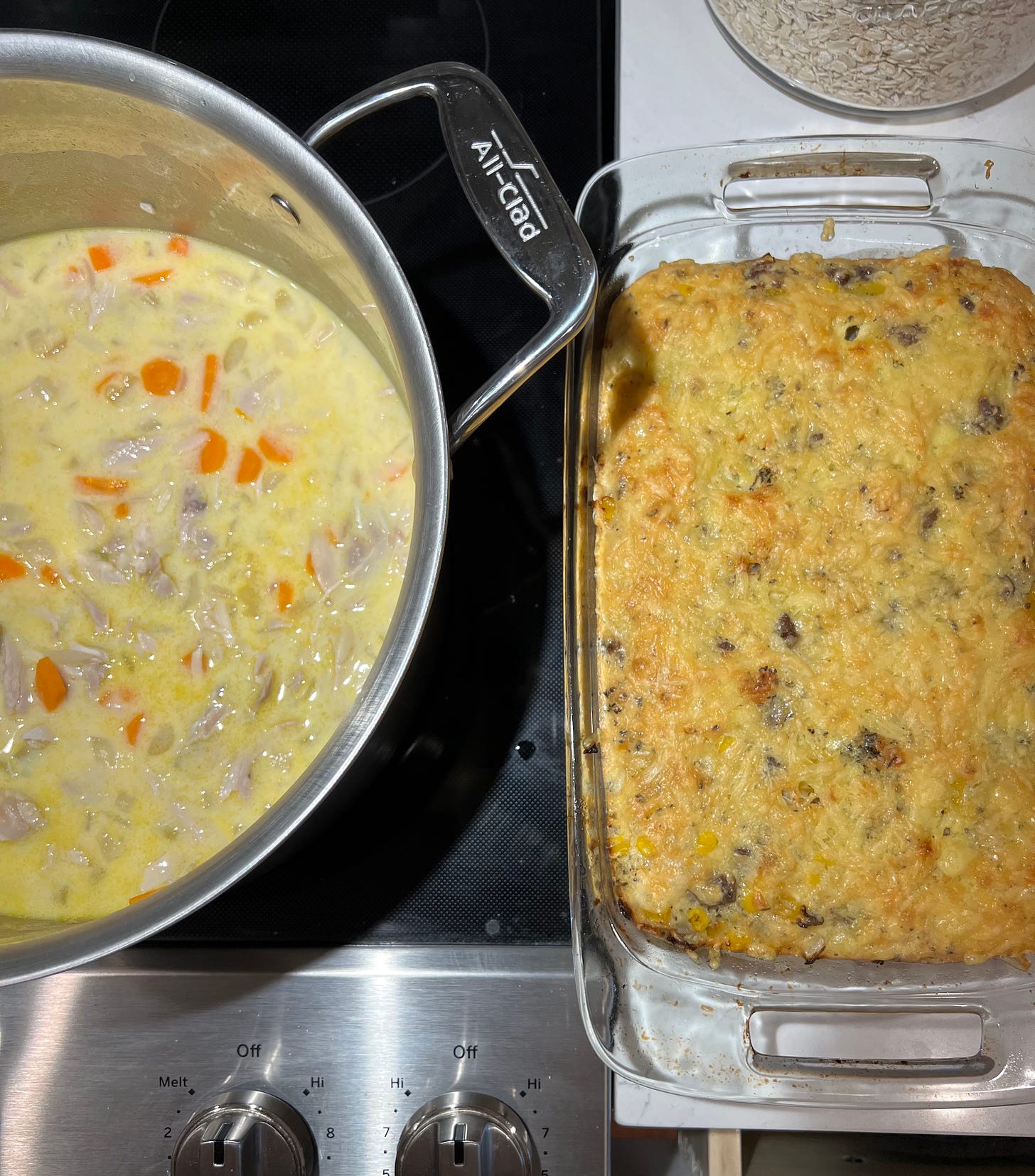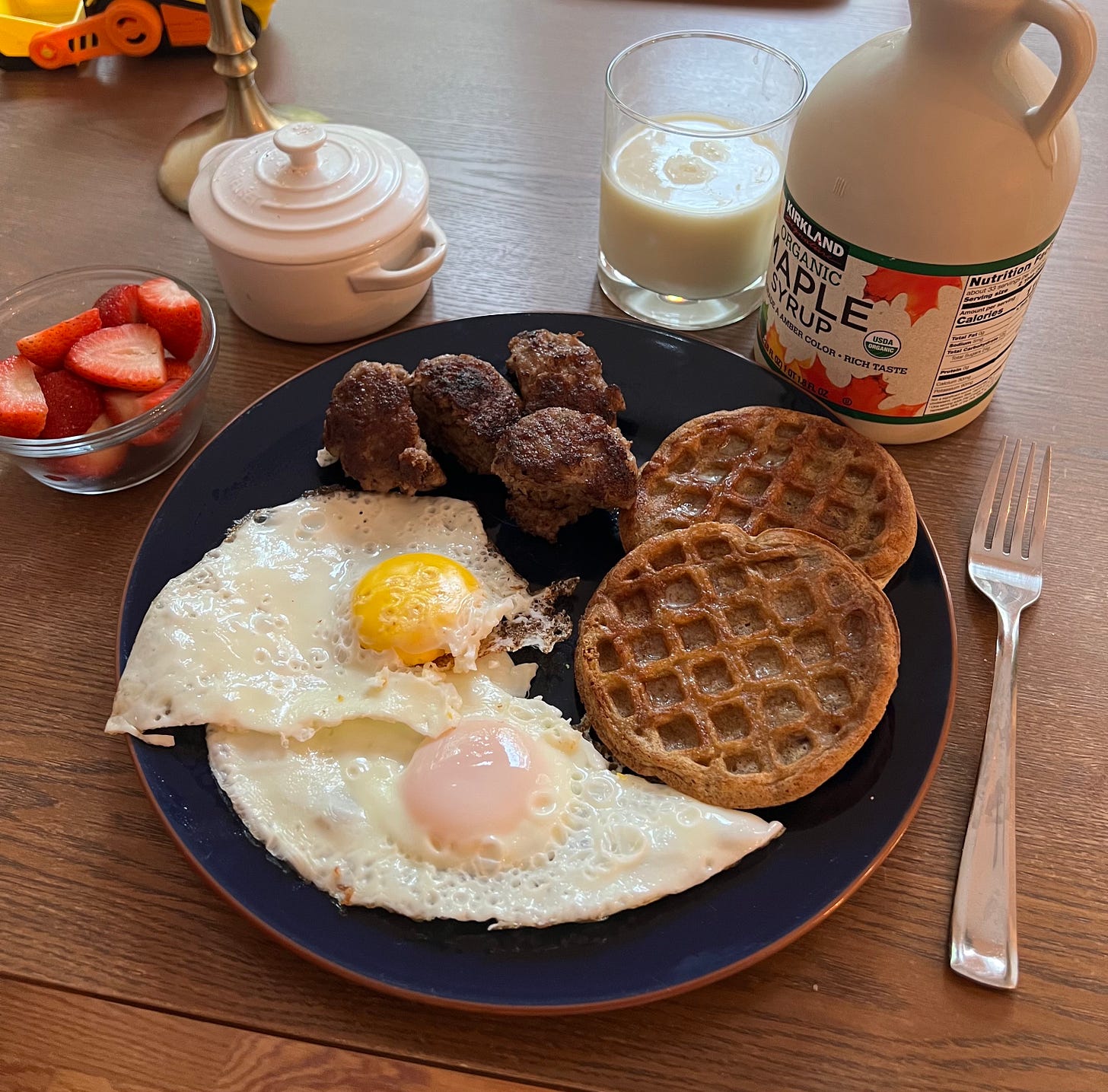Last week, I sent you a really long post outlining why I believe it’s bologna that people with lower incomes need highly processed foods because it’s often their only means of nourishment—or the most affordable.
But even if you can convince someone that it really can be cheaper to eat real food, they will often toss out one more argument: You’re forgetting about “time wealth!”
What is time wealth you might ask? The idea that people with more money have more time to shop and cook healthy food. Those living in poverty are working so much that even if they could get healthy groceries into their home, they wouldn’t have the time to cook it. OR that people living in poverty don’t have the time to grocery shop or the reliable transportation needed to get to the store. Makes sense on the surface, doesn’t it? And yes, there is a lot of truth in those statements.
Working significantly long hours and not having access to reliable transportation can certainly be a difficult roadblock to overcome on the journey to real food, but I want to argue that it doesn’t make it impossible.
If you haven’t read my first post, please do so before moving on. I encourage you to read it alongside this one because it’s where I offer some context around my own personal experience with this. I share about how my parents—despite being non-English speaking immigrants with multiple jobs each—cooked at home for us every single day growing up and why they never spent money on packaged foods at the store or even fast food.
I understand that everybody’s situation is different and unique, especially for those raising children with just one parent. I don’t know what it’s like to be a single parent or be raised by one, but I can only imagine it’s so, so hard.
While I want to be sensitive to those in dire circumstances, I also want to challenge our modern beliefs that cooking fresh food at home is impossible without a lot of money or time.
Argument #1: People Strapped for Time Can’t Cook From Scratch
Anytime I talk about “cooking from scratch,” especially using those exact words, I imagine the images that cross people’s minds include things like:
Stretching and folding sourdough all throughout the day for a fresh loaf at dinner
Authentic bolognese that took hours to simmer on the stove
Chicken pot pie with a homemade pie crust and peas I grew in my backyard garden
But here’s the funny part: I rarely do any of those things on a typical day (I don’t even have a garden!). While I cook the majority of my family’s meals at home and “from scratch,” the meals are usually simple and fast. They contain minimal ingredients and can be whipped up on short notice.
I’m talking about meals like:
Eggs and bacon with bread I keep in the freezer or fresh fruit
Taco soup that took me 15 minutes to throw together
Quesadillas made with last night’s leftover chicken and cheese that’s about to go bad
A burger patty I shape and season in less than 5 minutes with a side of roasted potatoes (that also took 5 minutes to chop, season, and throw in the oven)
Food from scratch sounds fancy, but all it means is that you took raw ingredients and prepared a meal out of them. There’s nothing in the definition that requires you to spend a certain amount of time in the kitchen cooking or cleaning up. There’s also not a requirement for cooking it fresh that same day. I serve my family many meals that I’ve previously made and then frozen so that I could have a quick, mess-free option on a busy night.
That’s why I don’t believe it’s impossible for people who are strapped for time to serve their families home cooked meals. My parents did it, I’ve always done it, and now I want to share some ideas on how you can do it, too:
Batch prep
Like I said earlier, just because you’re cooking from scratch, doesn’t mean you’re cooking every single day. Batch prepping is a popular phenomenon on social media for a reason! Families will choose a day when they can spend an hour or two in the kitchen and they will prep several meals at once that they can store for the week ahead. Here are some ideas on what to do on batch prep day:
Pre chop your fresh produce if you’re not cooking meals all the way. Not having to chop your celery and carrots will significantly reduce your time in the kitchen (both cooking and cleaning) on a busy weekday.
Make entire meals and separate them into individual containers for lunch and dinner that week.
Prep casseroles up until the baking portion. Cover them with foil and bake fresh during the week.
Prep your slow cooker and instant pot meals up until the cooking part. Put all the ingredients in a container or baggie so that all you have to do is dump them in the appliance the morning/evening of.
This doesn’t have to only involve dinners. Prep overnight oats and breakfast sandwiches at the start of the week for a breakfast-on-the-go each day.
Stock your freezer
If you’re able, buy enough ingredients to double your recipes so that you can stock your freezer with home cooked meals. You will thank your past self the day you come home totally spent and are tempted to run to McDonalds.
Meal plan
If you plan to cook fresh meals throughout the week, have a plan before the week begins. Sit down on a Sunday night, take inventory of what you have in the fridge and pantry and write down the meals you can throw together each day. Removing decision fatigue as a roadblock will also improve your chances of actually cooking and not succumbing to a microwave dinner.
Save your recipes
After you’ve spent some time in the kitchen, you will begin to notice which meals you can throw together the fastest and which your family is most likely to devour (you’ll also get faster at cooking those meals the more times you make them). Save these recipes somewhere and plan them around your busiest nights.
My favorite “fast foods” include taco soup, burgers on the stove, tacos, creamy chicken soup, and quesadillas. All of these meals can come together in about 15 and my family is guaranteed to enjoy it.
Have brinner
Don’t be afraid to serve your family eggs and pancakes for dinner or even oatmeal! First, your kids are sure to love this. Who doesn’t? Second, eggs are some of the quickest proteins (and most affordable) to whip up. So if all else fails, grab your eggs, whatever breakfast meat you have in the fridge, toast some bread or make some pancakes and get on with your evening.
(It’s so easy to add extra protein and nutrition to oatmeal so that you feel good about serving it as dinner. You can cook it in raw milk, slowly add in eggs—slowly so they don’t scramble but rather seamlessly blend in—peanut butter, multi collagen protein powder, raw butter, chia seeds, fresh fruit—our favorite in oats are bananas—and raw honey. It’s a warm cozy bowl your body will love!)
Argument #2: Choosing UPF Saves Time That Some Can’t Afford to Waste
This argument is similar to the first one with a “BUT.” Sure, there are ways to make cooking “faster,” BUT what if they can’t even manage to find the time for those 15 minute meals (and the grocery shopping to buy the ingredients)?
I have two responses:
We find time for what matters to us. The average American spends 3.1 hours a day watching T.V., 2.5 hours a day on social media, and about an hour commuting to work. Commuting might be a non-negotiable, but perhaps instead of constantly looking for ways to cut time spent on cooking, we should be looking at other areas of our lives that could use a little “budgeting” kick in the butt. That is, IF it matters to you to build a healthy body, nourish your family well, and age gracefully. If that’s not your goal, then by all means, keep on keeping on. We’ll never find the time to do things that don’t matter to us, so my advice is to start giving a d*mn and I’m confident you’ll find the time.
The same person who “can’t” afford to grocery shop or cook also can’t afford to get sick—acutely or chronically. A poor diet undoubtedly leads to a poor immune system. That means any little thing you catch on the Subway, at the office, or at your kid’s daycare is sure to make the person with a poor diet sicker than the person with a good diet. Can you afford to miss a day or a week from work because you got three colds this season? I’m assuming not. And if that’s the case, then you can’t afford to fuel your body with frankenfoods.
Then there’s the chronic illness: diabetes, high blood pressure, auto immune conditions, and so forth. Can the low-income earner afford those? The time off for doctor visits, the medical bills, the medicines? Food is medicine. Food prevents the breakdown of our bodies. Food can either keep you healthy or it can make you more susceptible to illness and disease. You tell me what’s more affordable.
Argument #3: Some People Can’t Access Grocery Stores
I hear this argument a lot. The activists says that too many people live in “food deserts” without reliable access to transportation, so getting to a grocery story isn’t even an option. And yet, the USDA estimates that only 6.1% of the U.S. population has trouble getting to a grocery store. Of course, it would be better if that number were zero, but can we at least admit that the majority of the population DOES have access to a grocery store? On top of that, in 2022, 91.7% of households in the U.S. had access to at least one vehicle.
So, is this really a good argument?
This Freakonomics podcast episode was very interesting, and I encourage you to take a listen if this topic interests you. The title is: Is Poor Nutrition a Supply Problem or a Demand Problem?
In this episode, the hosts discuss a paper about food deserts from The Quarterly Journal of Economics. The six scientists who co-wrote the paper wanted to know if the introduction of a new, local supermarket would impact the dietary habits of the existing population. They gathered extensive data and came to some interesting conclusions.
First, they discovered that people on average were driving about five miles to get groceries. So the argument about accessibility is already beginning to crumble.
To take it even further, if this argument were correct—that disadvantaged people are more likely to be obese or have obesity-related diseases because of their lack of access to a grocery store—then you would think that a new grocery store opening near them would completely rock their world in the best of ways, wouldn’t you? You would think, suddenly the local residents would be buying all kinds of fresh food that would reverse disease and build a healthy community…
Well, that’s not what this paper found.
The paper ultimately found that poor nutrition is not a supply problem… it’s a demand problem.
Even once communities get access to a closer grocery store, they might switch to the closer option, but their food habits don’t change.
That leads me to believe—based on my own personal experience and even the experience of the Freakonomics hosts—that the real problem is environmental. What I mean by that is: Habits are formed at home, during childhood and all the years after it. Of course I went to college and knew how to buy groceries and even cook simple meals because I was raised by parents who did it every single day.
But the young adult who went through the drive-thru with their parents multiple nights a week when they were growing up and ate cereal or a microwavable breakfast sandwich for breakfast everyday and ate a school lunch and always had access to packaged snacks at home… well, of course that person is more likely to continue the pattern, to continue eating that way, and feed their kids that way too.
How do we solve that problem instead? I’m not here to break down every possible solution, but off the top of my head, I’d suggest things like:
Education in school. Only about 6k schools across the U.S. still offer a home economics class. I’m not sure there’s a more valuable class for a young person than learning how to gather and cook real food for themselves. This should be a required course for every middle and high schooler (along with budgeting!). If you homeschool your children Homegrown Education has some fabulous resources for kids.
Mentorship. Communities like churches could mentor the younger generations in more than just spiritual practices, but life skills too. When I was newly married, I joined a class my church offered called Apples of Gold. In this class, a group of older women with adult children met with a large group of newly married women once a week. During this weekly meeting, one of the older woman would teach on a life skill (often revolving around food or home management). After the teaching, we’d gather to eat a gorgeous, homemade dinner and the “chef” would send us home with the recipe. By the end of the 6-week class, we had a binder full of recipes and other household tips. It was truly a memorable and enriching experience!
Personal responsibility. At the end of the day, remaining a victim of your circumstances and experiences takes you nowhere. Decide to take whatever control you can take and change your present and your future. We live in the information age, so even without a penny to your name, you can learn how to cook, what foods to buy, how to store them, etc. Move on. Move forward. Stop looking back and instead do better today.
Closing Thoughts
As I’ve grown older, I’ve really learned not to judge the decisions of those around me. I have zero insight into the context of their decision making—and frankly, it’s none of my business.
The only reason I bring these topics up today and with my last post are because I want anyone who has ever fallen victim to these half-truths to look at the issue in a different light. To spin it around and consider an alternative: that maybe eating real food is going to require more thought and effort. Maybe it will require more planning, more discipline on how you manage your time and structure your days, more time with a friend who’s confident in the kitchen, more effort learning and pushing yourself beyond your comfort zone… yes, maybe it will require all of those things, BUT if you’re looking for a change… if you’re looking for natural healing… if you’re tired of feeling sluggish and heavy and just not well… if you want to give your kids a better outcome than you had, then maybe it’s worth every ounce of your energy.
And if you believe that, I’m so confident you can do it.
Don’t believe the talking heads. Don’t let the narratives hold you back. Turn off the T.V. and get cooking.








Such good advice! I think, as you point out, sadly it probably does come down to your home life growing up and what skills you learn. Great ideas for increasing education through schools and community groups. We also need to encourage parents to get into the kitchen (and allow kids to watch and help!!) as role models for the next generations.
These posts give me a lot of hope. Because now we know, there IS time to cook!
One of my favourite meals is 3 fried eggs with a few cooked veggies (from frozen, steamed in the microwave for 3 minutes) and leftover mashed potatoes or a piece of toast. It takes less than 15 minutes to get this on the table.
But you’re right. You know how to do these things because you were exposed to it, and same here. So if someone is reading this and they want to learn how to do it, they can. Mentor under someone who is cooking meals. They can read about it, watch videos, and experiment. It isn’t rocket science, and we don’t have to make 5 course meals to cook from scratch.